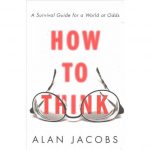“Five Questions with Nick Offerman about Wendell Berry.” Nick Offerman talks about Look & See, which aired on PBS this week.
“Remembering the ‘Spooky Wisdom’ of Our Agrarian Past.” Gracy Olmstead recommends that we attend to traditional forms of knowledge:
For millennia, humans have followed specific patterns passed down by their forbears without always knowing why. This is the essence of culture: the layers of belief and precedent, ritual and intuition that guide societal life and practice. As Maurice Telleen once put it, “A funny thing about cultures is that they produce people who understand more than they know. Sort of like osmosis.”
“Alan Jacobs: A Christian Intellectual for the Internet Age.” David Michael writes a thoughtful profile of Alan Jacobs. I don’t always agree with Alan, but I always read him with interest and learn from what he has to say. Rod Dreher is quoted in this piece with an apt description of Alan’s work: “Alan understands that technology is, more deeply, a way of construing reality. This is an alien thought to Americans who are neither Amish nor Wendell Berry.”
“The Man Who Ate with Capon.” Josh Retterer interviews Jamie Howison, an Anglican pastor who had several visits with Robert Farrar Capon. If you don’t know Capon’s work, start with The Supper of the Lamb, a most remarkable and delightful book.
Ragan Sutterfield—the author of several books, including Wendell Berry and the Given Life—speaks about the value of responding to global, ecological damage with love for our local, particular places.
“Book Review: Why Liberalism Failed.” Jake Meador reviews Patrick Deneen’s latest and parses some of the criticism it’s received.
“What Wendell Berry Wants.” Colette Shade reviews a new anthology of essays by Berry, The World-Ending Fire: The Essential Wendell Berry. She is frustrated by his politics, in large part because she seems to equate “politics” with “large-scale solutions.” Even so, she finds much to admire in Berry’s writing.
“A Devastating, Overdue Memorial to Lynching Victims.” Alexis Okeowo visits a new museum in Alabama that reckons with the ugly past of lynching.






2 comments
Russell Arben Fox
[Collette Shade] is frustrated by [Wendell Berry’s] politics, in large part because she seems to equate “politics” with “large-scale solutions.”
Yep, exactly. People who have read a lot of Berry recognize his politics as quite explicit, even partisan (he makes no apology whatsoever for his support for the Democratic party and the legacy of the New Deal). It’s just that his inflection point for all things political is the local community, and the local environment. To whatever extent any policy proposal allows for sustainable local adaptation, it’s worthy of consideration and defense; it’s only when the proposals in question treat the the large scale as incompatible with, or even directly opposed to, the local scale, that they earn Berry’s ire. And, of course, the latter orientation has, over the past half-century, been far more common than the former, a development both tragic and, given technological and economic developments, perhaps also unavoidable.
Jeffrey Bilbro
Indeed. I can understand if people want to critique Berry’s politics, but to say he “eschew[s] political categories” is rather baffling. He just eschews the reigning political categories and seeks to articulate a different kind of politics.
Comments are closed.